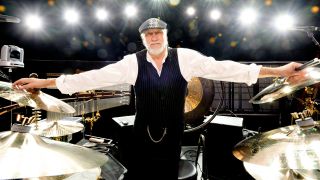There’s a theory that Fleetwood Mac operate on a 10-year cycle, one that reaches peak success, maximum drama or a combination of both whenever the year ends in a seven.
Since they formed in 1967, much of the band’s career has worked to that schedule. The year 1977 produced the world-beating Rumours, a soft rock masterpiece that played out against a backdrop of romantic complication and personal psychodrama. In 1987 it was Tango In The Night, a Yuppie-era landmark created amid struggles with drug addiction and barely suppressed acrimony that precipitated the departure of Lindsey Buckingham before the album had barely cooled on the shelves. Then 1997 was no less chaotic, with Buckingham returning for a lucrative live reunion, only for Christine McVie to bail soon afterwards.
If 2007 and 2017 – so far – have bucked this trend, it isn’t for lack of trying. The past 20 years of Fleetwood Mac have been no less eventful than their first 30, albeit for different reasons. The tangled relationships that exist between the five members – and especially between Buckingham and Stevie Nicks – continue to define the group as much as their music.
“There’s a subtext of love between us, and it would be hard to deny that much of what we’ve accomplished had something to do with trying to prove something to each other,” Buckingham said in 2013. “Maybe that’s fucked up, but this is someone I’ve known since I was sixteen, and on some weird level we’re still trying to work some things out.”
Or as drummer Mick Fleetwood neatly put it: “This band is the most abused franchise in the music business.”
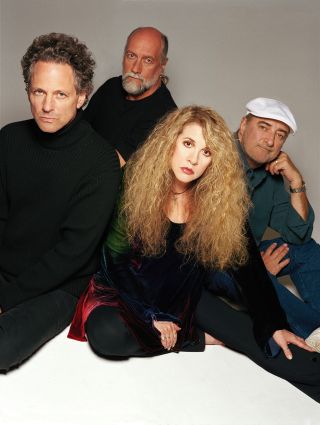
Mid-way through the 90s, Fleetwood Mac were in trouble. Their last studio album, 1995’s pallid Time had been a disaster. It wheezed into the lower reaches of the British charts for one week, and didn’t even make the US Top 200 – unthinkable only a few years before.
The problem was simple: there was no Lindsey Buckingham and no Stevie Nicks. It might have said ‘Fleetwood Mac’ on the record sleeve, but this was a pale imitation of the real thing.
After the band found themselves on a soulless US package tour, Mick Fleetwood decided that enough was enough. “It was starting to be too much hard work,” he said a few years later. “We made an album that was a total failure and I couldn’t see myself starting all over. So we stopped.”
Except it wasn’t that simple. The weird bond that existed between the members of Fleetwood Mac never allowed them to truly escape each other. Within weeks of putting things to bed, Fleetwood began working with Buckingham on his new solo album, soon pulling John and Christine McVie into their orbit.
Nicks hadn’t been idle during her time away from Mac, and by 1996 she was clean and, more surprisingly, collaborating with Buckingham again on Twisted, a song for the disaster movie Twister.
With Buckingham at the centre of things it was only a matter of time before the fragments of Fleetwood Mac were pieced back together. “Lindsey was very much the focus of it all,” acknowledged Fleetwood. “I’ve gotten real close to him over the last year, to a place we’ve never been before.”
Nicks was similarly effusive. “He and I are probably better friends than we’ve been in a long time,” he said of Fleetwood. “We had some really nice talks and some nice moments that were so sweet.”
In March 1997, the inevitable happened: the Rumours line-up announced officially that they would be reuniting for a tour later that year. Fleetwood Mac’s 10-year cycle was running on time.
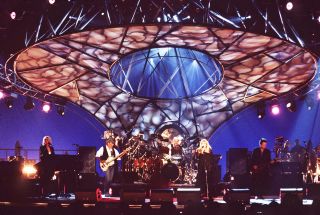
The first proper Fleetwood Mac concert to feature both Buckingham and Nicks since 1982 took place on May 23, 1997 at the Warner Brothers Studios in Los Angeles. Filmed for an MTV special and billed as The Dance – a name that could be read as a celebration of the reunion or a comment on the behind-the-scenes politics involved with it – the show was a hybrid of the old and the new, mixing stripped-down versions of 70s and 80s staples with a handful of new tracks. Two of those songs in particular, Buckingham’s stinging My Little Demon and the wistful Nicks-penned Say You Will, suggested Fleetwood had a viable future beyond this gig. That was proven when the attendant album went to No.1 in the US. After a turbulent few years, the train was back on the rails.
Predictably, a full tour followed. Publicly, the line being peddled was that they had all grown and matured since the tumult of the 70s and 80s. “The craziness that existed in eighty-seven and eighty-eight was gone,” Buckingham said. “I think the time apart helped us appreciate each other. This has always been a group of people you can say maybe didn’t belong in the same band together, but it’s the synergy that makes it so magical. We were able to see that more clearly.”
For Stevie Nicks, it wasn’t so straightforward. She reflected that while the magic was still there on stage, off stage it was a different matter. The simmering tensions between the singer and her old boyfriend had never truly cooled, and their relationship was trapped in a near-adolescent cycle of mutual adoration, frustration and enmity.
“It’s like the old days, because our spirits never really change,” she reflected in 2001. “It really is wonderful. It’s just not wonderful when the affair comes off stage. You can be in love on stage and that’s fine, but as soon as you mess up and take it off stage you don’t want to talk to people, you don’t want to stand next to them and you don’t want them to put their arm around you.”
This time, though, their rocky friendship was the least of the problems. Halfway through the tour, Christine McVie dropped a bombshell: she wanted out. “She flipped out and said: ‘I just can’t do this any more, I’m having panic attacks,’” said Nicks. “She sold her house and her car and her piano and moved back to England.”
Christine had effectively retired from Fleetwood Mac, and indeed from music altogether. Her departure upset the delicate power balance within the band even more than Buckingham and Nicks’s departure had done years before.
“She is the magic mediator,” said Nicks. “She’s the one that made light of everything and made everybody laugh and told us we were all full of shit. She was the person who made it all work.”
Christine took her bow at the beginning of 1998 when Fleetwood Mac were inducted into the Rock And Roll Hall Of Fame and received a Lifetime Achievement award at the Brits a few weeks later. “We’d said our goodbyes in America,” she said later. “We just all slipped away into the night.” For once in Fleetwood Mac’s career, there was no drama.
McVie’s departure effectively pushed the stand-by button on Fleetwood Mac for the next few years, even if Buckingham and Nicks couldn’t keep out of each other’s lives. In 2001, Nicks released a solo album, Trouble In Shangri-La, which featured Buckingham on one track, the aptly titled I Miss You.
Buckingham himself had been stockpiling songs during the 90s and early 00s, even bringing in his bandmates to play on some of them. In 2000 he presented an album, Gift Of Screws, to his label, Reprise. Their advice: “Save these songs for Fleetwood Mac.” Once again, Buckingham’s solo career had been hijacked for a greater cause.
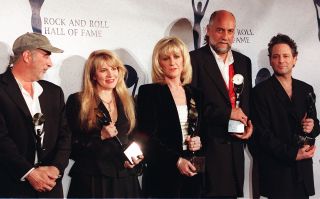
The songs that started life as a Lindsey Buckingham solo record mutated into Fleetwood Mac’s seventeenth studio album, Say You Will, released in 2003. It had been 16 years since Buckingham last appeared on one of the group’s studio albums, and six since The Dance. “It took us that long to figure out what the hell we were going to do without Christine,” said Nicks. “Or even if we could do it without her.”
It turned out that they could. Behind The Mask and Time had set the bar low, but Say You Will was the sound of a band finally catching up with themselves. Far from being a pallid recreation of past glories, tracks such as Peacekeeper and the kaleidoscopic Murrow Turning Over In His Grave threw off the shackles of nostalgia.
McVie wasn’t entirely absent – she sang backing vocals on Bleed To Love and Steal Your Heart Away, two tracks that were originally recorded for Buckingham’s postponed solo record. And Nicks had her share of songwriting credits, most notably on the title song and Illume 9-11, a mystical treatise on the World Trade Center attacks, even if the hefty 18-track running length carried the whiff of diplomatic tightrope walking in order to please everyone.
Mainly, though, Say You Will was Buckingham’s baby. As far back as Tusk, one of his chief roles had been to agitate the traditional Fleetwood Mac sound. Here, his protean songwriting and guitar playing wrong-footed anyone expecting Rumours Revisited or Tango In The Night 2. Indeed Red Rover and the bursts of borderline heavy-metal noise on Come sounded more like Buckingham solo tracks than Mac songs. Not everyone was entirely comfortable with this shift in focus.
“It was a nightmare doing that record,” Nicks later said of Say You Will. “It really was Lindsey’s vision and it wasn’t very much about the other three of us. And of course it was the first record we had ever attempted to do without Christine. Right there, the whole thing was completely insane.”
The public didn’t share her concerns, however. They were just happy to have a new album from this most iconic of ‘American’ groups, and pushed Say You Will into the US Top 5.
While the band presented a united front in public, the old strains soon came bubbling back. They may have been heading towards their sixtieth birthdays, but Buckingham and Nicks were still behaving like squabbling teenagers.

“On the Say You Will tour we were always fighting,” Nicks said in 2011. “Our up-and-down relationship never really changed. It’s no different than it was in 1976 when we broke up.” (Presumably any psychic wounds were at least partially salved by the $27 million the tour reportedly generated.)
With the combustible dynamic at the heart of Fleetwood Mac having exhausted more than one of its participants, once the tour was over the various members went back to their separate lives. Over the next few years, Nicks bounced between lucrative Greatest Hits tours and outings with old friends Don Henley and Tom Petty, while Buckingham finally released a solo album, 2006’s startling Under The Skin, and settled into the role of left-field auteur. Both patiently fielded questions about the future of Fleetwood Mac, although their answers were very different; Buckingham suggested that they might reunite for a tour in 2008, while Nicks was adamant that she would be unwilling to carry on without Christine McVie.
Nicks won that particular battle of wills, and a reunion failed to materialise, although matters weren’t helped when Nicks’s close friend Sheryl Crow claimed in 2008 that Fleetwood Mac would be touring the following year and that she would be involved. Typically, Buckingham denied that Crow’s participation had ever gone beyond a casual conversation, while Nicks insisted otherwise.
“It was absolutely discussed and she was absolutely invited to join,” Nicks said. “The reason was because I wanted another woman in the band – it’s hard to be in the boys’ club. I explained to Sheryl what it was like to be in the group – that it’s all-encompassing. Like, on the Say You Will tour we went out expecting to do forty shows, and it turned into a hundred and thirty-five shows. So Sheryl called me and said: ‘I’ll have to pass.’”
As it turned out, Fleetwood Mac were reactivated in 2009 for a tour. Crow wasn’t involved, and neither was Christine, although she was in the audience for their show in London. At the same time, a BBC documentary cast light on the current state of the Buckingham-Nicks relationship. “Maybe when we’re seventy-five and Fleetwood Mac is a distant memory, we might be friends,” said Nicks.
Buckingham held the reins earlier in the decade, but now things had become more complicated. A passive-aggressive power struggle played out in the press. In 2011 the guitarist suggested that Fleetwood Mac were ready to return. “We’re doing something for sure,” he said. “I wouldn’t be shocked if it was a tour and possibly an album. We’ll have to wait and see. With Fleetwood Mac there’s a lot of land mines out there politically, and it’s hard to get everybody on the same page at the same time, but I think this might be one of those years where everyone will want to do the same thing. Whatever that is.”
Nicks felt differently. She decided to instead concentrate on her solo album, In Your Dreams. In his very polite, very British way, Mick Fleetwood put the blame for the inaction at the Nicks’s feet. “For now she refuses to do a Fleetwood Mac tour. It’s down to her,” he said in 2012. “I don’t believe Fleetwood Mac will ever tour again,” he added pessimistically.
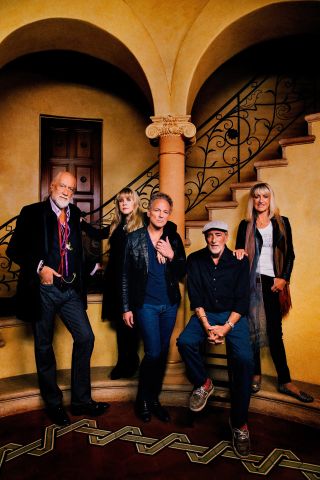
In the event, he was wrong on both counts. Nicks changed her mind and the band hit the road again in 2013. They even had a new EP to promote, the prosaically titled Extended Play, comprising three songs from Buckingham and one from Nicks.
If that was a surprise, then it was nothing compared to what happened next. When the tour reached London, they were joined on stage by an unexpected guest: the supposedly retired Christine McVie, who pitched in on a rapturously received Don’t Stop.
“I had this idea that I’d love the small village life, with the Range Rover and the dogs and baking cookies for the YWCA,” she explained of her lengthy hiatus from music. “But then it got so boring. You couldn’t walk down the road without meeting two people related to each other. I missed the songs. And I missed the audience.”
Sure enough, Christine rejoined Fleetwood Mac officially at the start of 2014. Her return reinstated the group’s best-known line-up, though it did little to ease the push-me-pull-you dynamics between two of its chief protagonists.
“Relations between Lindsey and I are as exactly as they have been since we broke up,” Nicks said. “He and I will always be antagonising each other and we will always do things that will irritate each other, and we really know how to push each other’s buttons. We know exactly what to say when we really want to throw a dagger in.”
Nicks’s ongoing refusal to get involved in a new Fleetwood Mac album wasn’t button-pushing as much as the act of a person determined to retain control of their life. But it seemingly frustrated Buckingham, who has subsequently attempted to persuade, cajole and plead with his on-off partner into re-engage with the process. His suggestion in 2015 that Fleetwood Mac were entering their “last act” read suspiciously like an attempt at a guilt trip. But still Nicks has refused to budge.
In terms of their own 10-year-cycle, 2017 has been relatively quiet. Evidently tired of waiting, Buckingham and Christine McVie released an album together in June. Comprising material that dates back to 2014 and featuring appearances from Mick Fleetwood and John McVie, it is effectively a Fleetwood Mac record without Stevie Nicks.
But the story of “the most abused franchise in music” is still being written. A new tour featuring the Rumours line-up has been announced for 2018. Mick Fleetwood recently said that they are sitting on “a huge amount of recorded music”, although “virtually none of it” features Nicks. Given the constant state of flux Fleetwood Mac exist in, only a fool would rule out the notion of it ever appearing.
“God knows, our lives are unimaginable without each other,” Mick Fleetwood has said. It was true in 1977, it’s even more so today.
Mick Fleetwood recalls the “wild story” of Fleetwood Mac's early years
How Rumours took Fleetwood Mac to the peak of their success
Stevie Nicks: "All of us were drug addicts, but I was the worst"
